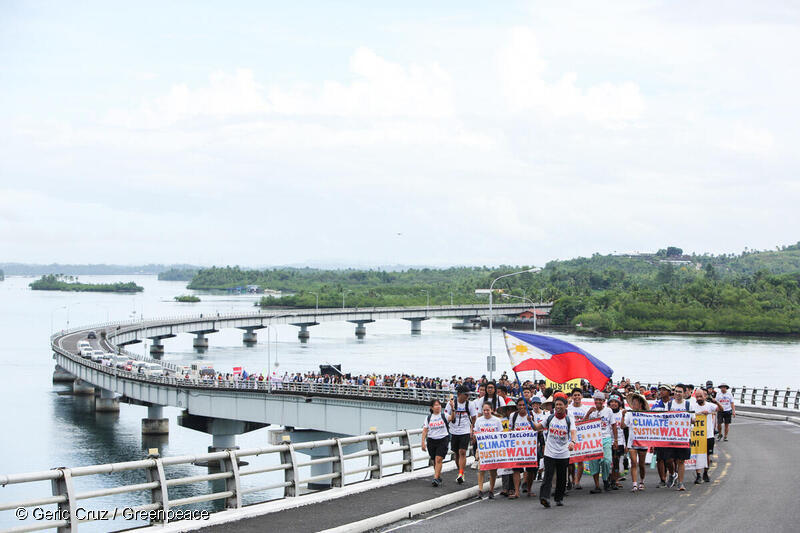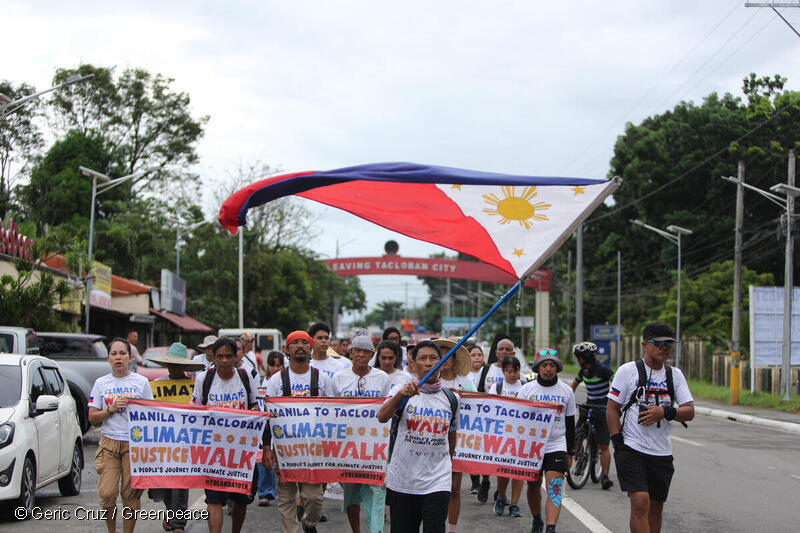Tacloban, 7 November 2023— Almost a month since leaving Manila’s Kilometer Zero and in time for Super Typhoon Yolanda’s 10th commemoration, the Climate Justice Walk team finally reached Tacloban, ‘Ground Zero’ of Yolanda (international name Haiyan)- the Philippines’ deadliest case of extreme weather which claimed more than 6,000 lives in 2013. The team of 28 Climate Walkers were joined by a crowd of more than 500 composed of Yolanda survivors and local supporters who welcomed the team as they crossed the iconic San Juanico Bridge from Sta. Rita Junction in Samar to Tacloban City in Leyte. [1]

Embarking on this journey on 8 October, the solidarity walk for Climate Justice covered a distance of roughly 1,000 kilometers, reminiscent of the 2014 Climate Walk that marked the 1st Yolanda anniversary. Enduring the harsh sun and occasional rains, the team traveled on foot, bike and ferry, and made 30 key stops where they were joined by civic and church leaders, raising awareness on climate action and Climate Justice in schools and parishes As a direct result, Climate Emergency was declared in two of the stops – Albay and Catbalogan – as they both recognized the need for urgent climate action, phasing out fossil fuels, and for stronger global and national measures on loss and damages.

Joanna Sustento Bacsa, Activist and Haiyan Survivor said:
“Being a part of this year’s Climate Justice Walk takes me back to 10 years ago when Tacloban was in complete shambles due to Typhoon Yolanda. My brother and I were walking aimlessly, looking for food, for shelter, and for our loved ones. The realization that you lost everything yet you survived gave no comfort, no destination. We walked along with others, yet I have never felt so alone. Now, a decade later, I find myself walking again but with a whole community undertaking a meaningful journey for Climate Justice. I am also walking as a wife and a first-time mom. I am no longer alone in this fight.”
Yeb Saño, Lead Walker and Executive Director of Greenpeace Southeast Asia said:
“The Climate Justice Walk does not end in Tacloban. Our real destination is in people’s hearts and minds- for climate hope to take root and yield results. The Walk is a manifestation of the positive changes happening at the grassroots level. We note the invaluable initiatives and contributions of church leaders and civil society groups to reiterate calls to protect the environment and for systemic change from the ground up. Most of all, we commend the leadership of the local governments of Albay and Catbalogan who made Climate Emergency declarations to make their cities and municipalities more climate-resilient and cease support for fossil-fuel projects, aligning with the Paris Agreement of limiting temperature rise to 1.5C to avoid the worst impacts of catastrophic climate change. Greenpeace believes that for climate justice to be realized, the world’s biggest climate polluters must be held accountable and pay up for their contribution to the climate crisis.”
Rodne Galicha, Executive Director of Living Laudato Sí Philippines said:
“We firmly hope that the screams and wails of losses and damages reach the hearts and minds of those who are responsible for the climate crisis. We have seen the community of nations extend the much-needed assistance ten years ago but we Filipinos cannot afford to always be recipients of disaster response. We need long-term climate solutions to help communities be prepared and ready to cope and face the challenges of this crisis. But above all, polluters must pay and be held accountable. Climate crimes must be litigated and climate debt must be settled.”
Edicio dela Torre, President,Philippine Rural Reconstruction Movement said:
“Our warmest congratulations to the Climate Justice Walk team for making the journey for Climate Justice. Ten years ago, we walked in solidarity with them to shine the light on the phenomenon of climate change, the reality of how devastating its impacts on people’s lives, especially to the poorest and most vulnerable. We remember those who died, those who were left behind with the trauma and are still in grief, and celebrate those who have stood up again to rebuild hopefully better lives. We carry the hope that the Climate Justice Walk will continue to push positive actions for justice.”
The Philippines is precariously located just above the equator, where the eastern seaboard serves as a welcome mat for most of the tropical cyclones that devastate the Asia-Pacific every year. The country’s Eastern Visayas region was defenseless against Yolanda’s powerful winds of 305 to 313 kph, making it the strongest cyclone ever at the time of landfall. The storm was not only the deadliest but also the costliest at USD 12 billion.
While most Filipinos claim they have “little to sufficient knowledge about climate change”, a recent survey found that 68% percent of respondents said they believed “climate change is dangerous to the environment”, while 71% percent of respondents said that “climate change posed danger to their families”.
Mirroring the challenges experienced by climate-impacted communities, the volunteer walkers and bikers endured the relentless heat and humidity affecting people and their livelihoods such as farming, experienced power interruptions due to low reserves, and poor and inadequate water supply. With the constant threat of the climate emergency, local and national governments must work together with communities to create and roll out concrete plans for climate adaptation and mitigation.
Notes to the Editor:
[1] The Climate Walk first began in 2014 as a solidarity walk for the people of Tacloban who were still reeling from the devastating impacts a year after the onslaught of Typhoon Yolanda. The CSO and interfaith walk was led by Naderev “Yeb” Saño, then a Climate Negotiator for the Philippines at the UN Climate Conference of Parties.
Supporting the Climate Justice Walk 2023: A People’s Caravan for Climate Justice are the Bikers United Movement (B.U.M.), DAKILA, FundLife, Greenpeace Southeast Asia, Living Laudato Si, PMCJ, and the different Archdioceses from Manila to Leyte.
Partners in Tacloban include Amnesty Philippines- Eastern Visayas, OXFAM Philippines, Firefly Brigade, Roots, Angels on Wheels, Eagles, Philippine College of Physicians Committee on Climate Change, Philippine Red Cross, Save Kankabatok Advocacy, Kankabatok Kolektib, Philippine Movement for Climate Justice, Estehanon Climate Volunteers, Tacloban Peer Educator Association, TOES, Waray Bugsay Dragon Boat Crew, CEED, Youth for Climate Hope, SEACC, Seventh Day Adventist Youth, Youth for Human and Ecological Security Organization, Tacloban Youth Volunteers Movement (TYVM)), Pintakasi Hub, BAKHAW Youth Organization, SK Brgy. 97, Department of Education Tacloban City Division, EMB- Tacloban, EMB RO8, CENRO- Palo, CFARMC Tacloban, STEFTI, Leyte Normal University, UP Student Council, UP- REIS, SPSPS, Kinabuhing Lunhaw Creatives, Inc., YHES, CBYOC, Hoteliers and Restaurateurs Circle (HRC), Magdalo, Focolare Movement, Boy Scouts of the Philippines, LGU of Catbalogan, Province of Leyte, TACRU and TOMECO
Photos and videos will be available here
Media Contacts:
Therese Salvador, Communications Coordinator for Greenpeace Southeast Asia
M: +639178228734 E: [email protected]
